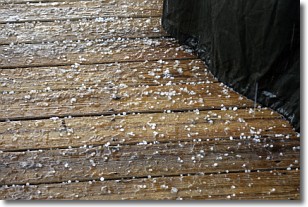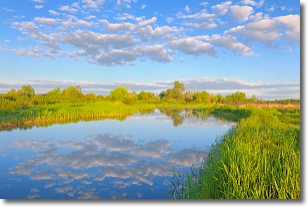Weather Alert in Oklahoma
Flood Advisory issued April 28 at 8:03PM CDT until May 1 at 7:00AM CDT by NWS Norman OK
AREAS AFFECTED: Love, OK; Cooke, TX
DESCRIPTION: ...The Flood Advisory continues for the following rivers in Oklahoma...Texas... Red River near Gainesville affecting Cooke and Love Counties. * WHAT...Flooding caused by excessive rainfall continues. * WHERE...Red River near Gainesville. * WHEN...Until Thursday morning. * IMPACTS...At 24.0 feet, Low-lying fields... upstream in western Love County in Oklahoma... and Cooke County in Texas... may experience shallow overflows several hours before the crest reaches the Interstate Highway I-35 crossing north of Gainesville. Sandpit operations may be affected. Livestock and other property should be removed to places which are higher than nearby river banks to avoid being stranded. * ADDITIONAL DETAILS... - At 7:00 PM CDT Monday the stage was 22.3 feet. - Bankfull stage is 25.0 feet. - Forecast...The Red River is expected to rise to a crest of 23.1 feet tomorrow evening. - Action stage is 22.0 feet. - Flood stage is 25.0 feet. - http://www.weather.gov/safety/flood
INSTRUCTION: If you encounter a flooded roadway, turn around and find an alternative route. Caution is urged when walking near riverbanks. Additional information is available at www.weather.gov.
Want more detail? Get the Complete 7 Day and Night Detailed Forecast!
Current U.S. National Radar--Current
The Current National Weather Radar is shown below with a UTC Time (subtract 5 hours from UTC to get Eastern Time).

National Weather Forecast--Current
The Current National Weather Forecast and National Weather Map are shown below.

National Weather Forecast for Tomorrow
Tomorrow National Weather Forecast and Tomorrow National Weather Map are show below.

North America Water Vapor (Moisture)
This map shows recent moisture content over North America. Bright and colored areas show high moisture (ie, clouds); brown indicates very little moisture present; black indicates no moisture.

Weather Topic: What is Sleet?
Home - Education - Precipitation - Sleet
 Next Topic: Snow
Next Topic: Snow
Sleet is a form of precipitation in which small ice pellets are the primary
components. These ice pellets are smaller and more translucent than hailstones,
and harder than graupel. Sleet is caused by specific atmospheric conditions and
therefore typically doesn't last for extended periods of time.
The condition which leads to sleet formation requires a warmer body of air to be
wedged in between two sub-freezing bodies of air. When snow falls through a warmer
layer of air it melts, and as it falls through the next sub-freezing body of air
it freezes again, forming ice pellets known as sleet. In some cases, water
droplets don't have time to freeze before reaching the surface and the result is
freezing rain.
Next Topic: Snow
Weather Topic: What are Stratocumulus Clouds?
Home - Education - Cloud Types - Stratocumulus Clouds
 Next Topic: Stratus Clouds
Next Topic: Stratus Clouds
Stratocumulus clouds are similar to altocumulus clouds in their
fluffy appearance, but have a slightly darker shade due to their additional mass.
A good way to distinguish the two cloud types is to hold your hand out and measure
the size of an individual cloud; if it is the size of your thumb it is generally
an altocumulus cloud, if it is the size of your hand it is generally a
stratocumulus cloud.
It is uncommon for stratocumulus clouds to produce precipitation, but if they do
it is usually a light rain or snow.
Next Topic: Stratus Clouds
Current conditions powered by WeatherAPI.com




